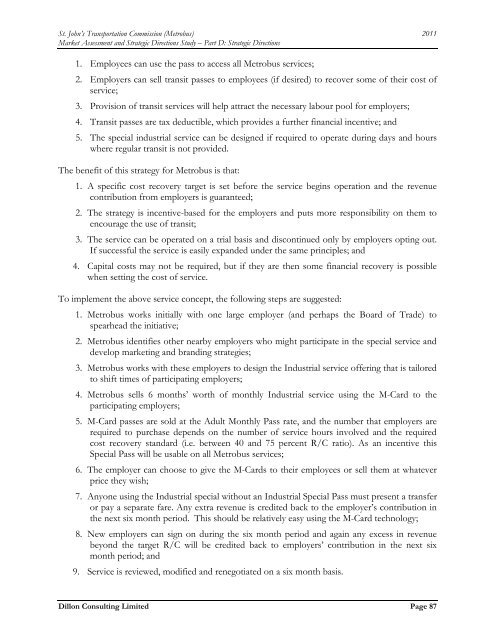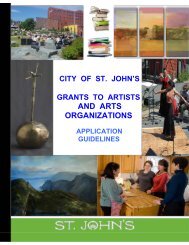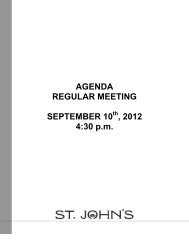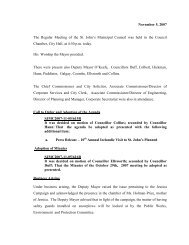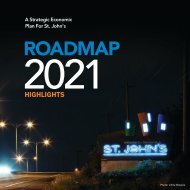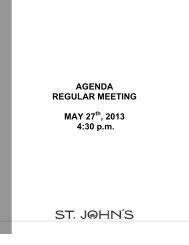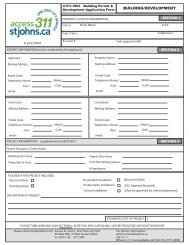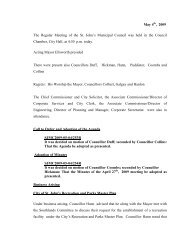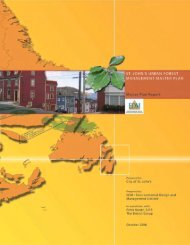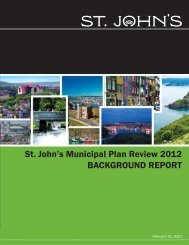Metrobus Transit Study.pdf - City of St. John's
Metrobus Transit Study.pdf - City of St. John's
Metrobus Transit Study.pdf - City of St. John's
You also want an ePaper? Increase the reach of your titles
YUMPU automatically turns print PDFs into web optimized ePapers that Google loves.
<strong>St</strong>. John’s Transportation Commission (<strong>Metrobus</strong>) 2011<br />
Market Assessment and <strong>St</strong>rategic Directions <strong><strong>St</strong>udy</strong> – Part D: <strong>St</strong>rategic Directions<br />
1. Employees can use the pass to access all <strong>Metrobus</strong> services;<br />
2. Employers can sell transit passes to employees (if desired) to recover some <strong>of</strong> their cost <strong>of</strong><br />
service;<br />
3. Provision <strong>of</strong> transit services will help attract the necessary labour pool for employers;<br />
4. <strong>Transit</strong> passes are tax deductible, which provides a further financial incentive; and<br />
5. The special industrial service can be designed if required to operate during days and hours<br />
where regular transit is not provided.<br />
The benefit <strong>of</strong> this strategy for <strong>Metrobus</strong> is that:<br />
1. A specific cost recovery target is set before the service begins operation and the revenue<br />
contribution from employers is guaranteed;<br />
2. The strategy is incentive-based for the employers and puts more responsibility on them to<br />
encourage the use <strong>of</strong> transit;<br />
3. The service can be operated on a trial basis and discontinued only by employers opting out.<br />
If successful the service is easily expanded under the same principles; and<br />
4. Capital costs may not be required, but if they are then some financial recovery is possible<br />
when setting the cost <strong>of</strong> service.<br />
To implement the above service concept, the following steps are suggested:<br />
1. <strong>Metrobus</strong> works initially with one large employer (and perhaps the Board <strong>of</strong> Trade) to<br />
spearhead the initiative;<br />
2. <strong>Metrobus</strong> identifies other nearby employers who might participate in the special service and<br />
develop marketing and branding strategies;<br />
3. <strong>Metrobus</strong> works with these employers to design the Industrial service <strong>of</strong>fering that is tailored<br />
to shift times <strong>of</strong> participating employers;<br />
4. <strong>Metrobus</strong> sells 6 months’ worth <strong>of</strong> monthly Industrial service using the M-Card to the<br />
participating employers;<br />
5. M-Card passes are sold at the Adult Monthly Pass rate, and the number that employers are<br />
required to purchase depends on the number <strong>of</strong> service hours involved and the required<br />
cost recovery standard (i.e. between 40 and 75 percent R/C ratio). As an incentive this<br />
Special Pass will be usable on all <strong>Metrobus</strong> services;<br />
6. The employer can choose to give the M-Cards to their employees or sell them at whatever<br />
price they wish;<br />
7. Anyone using the Industrial special without an Industrial Special Pass must present a transfer<br />
or pay a separate fare. Any extra revenue is credited back to the employer’s contribution in<br />
the next six month period. This should be relatively easy using the M-Card technology;<br />
8. New employers can sign on during the six month period and again any excess in revenue<br />
beyond the target R/C will be credited back to employers’ contribution in the next six<br />
month period; and<br />
9. Service is reviewed, modified and renegotiated on a six month basis.<br />
Dillon Consulting Limited Page 87


